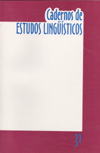Resumo
This article investigates the internal structure of genitive arguments of a name in the noun phrase of Brazilian Portuguese. It is argued that these arguments are arranged in the following hierarchical structure: [[[name THEME]AGENT/EXPERIENCER]POSSESSIVE]. The theoretical background of the discussion is the Principles and Parameters theory (cf. Chomsky, 1981, 1986a, 1986b).Referências
CASTILHO, A. & PRETI, D. A Linguagem Falada Culta na Cidade de São Paulo: Elocuções Formais, vol 1. SP:Queirós/FAPESP, 1986.
CHOMSKY, N. Lectures on Government and Binding. Dordrecht:Foris, 1981.
______. Knowledge of Language: Its Nature, Origin, and Use. Convergence Series, New York/London: Praeger, 1986a.
______. Barriers. Cambridge, MA:MIT Press, 1986b.
FRANCHI, C. “Anotações”. mimeo, 1996.
GIORGI, A. & G.LONGOBARDI. The syntax of noun phrases. Cambridge:Cambridge University Press, 1991.
GRIMSHAW, J. Argument Structure. Cambridge:MIT Press, 1990.
HIGGINBOTHAM, J. “Logical Form, Binding and Nominals”. Linguistic Inquiry 14; 1983:395-420.
LEBEAUX, D. “Locality and Anaphoric Binding”. The Linguistic Review 4, 1984-1985:343-363.
MILNER. Ordres et raisons de langue. Paris:Seuil, 1982.
MÜLLER, A.L. “A Sintaxe e a Semântica do sintagma nominal com argumentos genitivos”. (em preparação), 1996.
REINHART, T. & E. REULAND. “Reflexivity”. Linguistic Inquiry 24 (4); 1993:657-720.
VENDLER, Z. [1967] (1968). Linguistics in Philosophy. Ithaca, N.Y.: Cornell University Press, 1968.
O periódico Cadernos de Estudos Linguísticos utiliza a licença do Creative Commons (CC), preservando assim, a integridade dos artigos em ambiente de acesso aberto.

